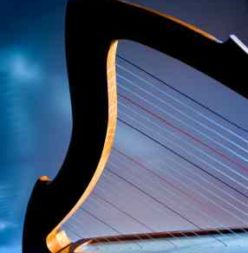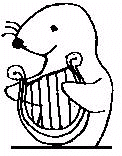This post is about the prerequisites for learning to play the harp. Do I mean reading music? Or piano experience? Or some other musical background? Breathe easy; those things are lovely to have but absolutely not necessary. Instead, you need these 4 attitudes to get started with your harping adventure and to return to when you feel frustrated (that’s inevitable) and need some inspiration.
So, here are my 4 prerequisites every adult harp student needs:
1 – Honor yourself enough to make time for what delights you
This means you have to follow your own heart and notice what delights YOU. Try lots of new things and revel in what you love. On the larger level, allowing yourself to learn, allowing yourself to put time at the harp above all the other demands that crowd your life, requires that you honor your delight for the harp and your right to play it.
I tell my students that life is too short to play things you hate. This means it’s up to you to abandon a piece you loathe, especially if you’ve already conquered the technical skills in it. If you haven’t yet gained those skills (like 4-finger arpeggios or harmonics), try to find a piece you love that will draw you to practicing them.
2 – Become an unapologetic “imperfectionist”
If you spend all of your time at the harp worrying about your next mistake, or your last one, you cripple your ability to enjoy music. Having a goal, trying to learn something new, using practice strategies to gain fluency at the harp–these are all laudable and important.
How do you get to your goals? By getting of your own way, letting the mistakes happen, and then looking at what happened with the open curiosity of a detective. Brains don’t learn without mistakes. If you need help with this step, I heartily recommend this book:
The Perfect Wrong Note, by William Westney
3 – Step out of your comfort zone
Learning a complex new skill requires us to be–GASP–a beginner. You’re a bright, articulate, competent adult, fearful of looking foolish (or worse, “stupid”). Reframe this fear: “Foolish” can mean simply playful and uninhibited; you’re never “stupid” simply because you don’t know something, so acknowledge the fact that you will never run out of wonderful new things to learn.
If you already knew everything, wouldn’t life be truly uninspiring? Greet that new land of music (note reading? harp technique? improvisation?) as the juicy possibility it is to make endless, exciting discoveries. You’ll be amazed at what you can actually do once you put the focus on the new skill, rather than whether you feel awkward or not. Which brings me to . . .
4 – Share your joy
When its time to play for anyone–your teacher, your neighbor, your yoga class, or simply your loved ones–remember that you love music. You love the harp, you love these sounds, you want to share them from that inexhaustible source of passion. It’s not about you, but about giving someone else a glimpse into this magical world.
If you set an intention, and focus on that, and let the music arrive in your heart BEFORE you start playing, then you are giving the gift of real presence. When you make a mistake, come back to the intention, the sharing. We are all on your side, and it is, after all, a harp!
This post is adapted from material that I originally published in the ezine, Notes from the Harp.


Just what I needed as I have given up on some pieces I couldn’t get the hang of or didn’t “feel” and you have just made me feel OK about that. I love your posts. Thanks. BJ (50yrs with no musical background except ballet as a child!!)
Glad it helped, Bj!
This is a great post! One thing I would add to #1– think about what you want to be able to do. Do you want to tackle complex pieces for the challenge? Do you want to be able to play for friends? Do you want to be able to play with others? Improvise and fill in? Don’t be afraid to say so, and also don’t be afraid to change your goals as time goes on.
I agree, Robin! I would also say that it helps to create a clear picture of yourself as the kind of harper you wish to be, using your great questions and others like them, and to periodically revisit your picture as your goals evolve. You will know when to push yourself a bit harder in a certain direction if you can keep this picture in mind.
Great advice that can apply to any musician regardless of the instrument
Thanks!
i wish i had seen this when i first started this amazingly fabulous and difficult instrument 5 yrs ago, at age 60+
as an RN, i’m used to “see one, do one ,teach one”, and it happens NOW. not with the harp , it doesn’t!